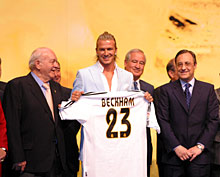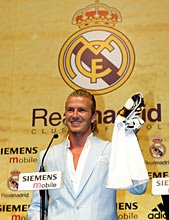
Let the phoney war begin. Hostilities will not commence for another six months, but the opponents are known, along with the battle grounds.
Paraguay, Trinidad and Tobago and Sweden lie in wait and Sven-Goran Eriksson already has his troops in position.
NealSimpson/Empics
For better or worse Peter Crouch remains Sven's only plan B.
Indeed, to hazard a guess, he has as many as 20 players pencilled in. Injury permitting, a summer in Germany awaits for them. Excellent news for those players, the beneficiaries of continuity of selection, but a move that threatens the late arrival in the squad, once an intriguing ingredient of any major tournament, with extinction.
And this is to be lamented. The surprise package has had a catalytic role in previous England campaigns. Four years ago, it was Trevor Sinclair, the unlikely and, as it turned out, brief solution to Eriksson's left-sided problems. In 1990, David Platt's prolific form for Aston Villa propelled him into the squad, and he swivelled to volley England into the quarter-finals.
And though home advantage gave Sir Alf Ramsey the luxury of more time to prepare for the 1966 World Cup, few had inked in Martin Peters, Alan Ball and Geoff Hurst for pivotal roles in the preceding months. Ramsey's wonders, meanwhile, only became wingless during the group stage.
In 2004, Eriksson appeared to determine selection during his long winter break. It was to the detriment of Jermain Defoe and Shaun Wright-Phillips, whose visible sharpness in the second half of the season earned them accolades, but not squad places in Portugal.
They were the form players, but Darius Vassell and Kieron Dyer were preferred, though Eriksson has subsequently admitted he should have opted for Defoe. Now, in a reversal of fortunes, they could profit from a similarly early choice. They are now the men in possession, albeit when consigned to the bench for both club and country.
Two years on, the Swede should not make the same mistake. However, in his defence, he has little scope for experimentation. England have just three more matches, and only one before May. It provides scant opportunity to state a case, even for the most eloquent of footballers. Nor, however, have Eriksson's friendlies provided the ideal environment for contenders.
His first 11 is almost finalised, the sole debating point being the final midfield position contested by Ledley King and Joe Cole. In his reserves, Eriksson appears to favour loyalty, versatility and youth, perhaps scarred by Gareth Southgate's recollections of the campaign in Japan. Those who have not complained about their bit-part roles in the qualifying campaign, therefore, are in pole position.
And much as their managers champion their causes, the wannabes should be aware that even squad members in the current England party have considerable job security.
Stuart Pearce has been vocal about the resurgent Vassell, but Defoe has understudied Michael Owen since Euro 2004. James Beattie, with a blend of optimism and naivety has spoken about making it difficult for Eriksson to ignore him, but the Swede, like Rafael Benitez, stood by Peter Crouch during his lengthy goal drought. His late appearance against Argentina - while Owen struck twice - surely cemented his place; Steve Bruce's pleas on behalf of Emile Heskey must be in vain.
And once discarded, there is rarely a reprieve; Eriksson, it seems, does have a steely side. Only David James has returned, and that owes much to the lack of English goalkeepers. Chris Kirkland, should he stay fit, seems a certainty. Robert Green, meanwhile, behind one of the Championship's leakier defences, may be grateful that he is not in the limelight.
In defence, the FA must have been instructed to take the suit measurements of the first-choice back four of Gary Neville, Rio Ferdinand, John Terry and Ashley Cole plus King, Sol Campbell and Luke Young, now firmly established as the deputy at right back.
JonBuckle/Empics
Parker's combative performances for Newcastle may yet book him a seat of the plane to Germany.
Were Eriksson's wishes granted, Wayne Bridge would be joining them. But he now appears to be Chelsea's third-choice left back, providing an incentive for Paul Konchesky and Kieran Richardson, while the adaptability of Phil Neville and Jamie Carragher makes them other options. At the back, the only wild card is Jonathan Woodgate, whose fitness cannot be taken for granted, but who is the only outsider who could complicate Eriksson's thinking.
In midfield, David Beckham, Frank Lampard and Steven Gerrard are the untouchables, and Joe Cole completes a quartet of automatic selections.
Wright-Phillips and Jermaine Jenas can expect a ticket to Germany as a reward for whiling away hours on the bench. It leaves two positions up for grabs in perhaps the only area where Eriksson is open to persuasion. One, however, may be delegated to another defensive player as both Neville and King are options as an anchor midfielder. So, too, is Michael Carrick, so impressive in the USA last summer, but off the international stage since then.
And for the final spot, in the interests of balance, a left-footer has appeal. Richardson has become a regular in the squad but Stewart Downing, currently sidelined, but capped by Eriksson, would be the more adventurous option.
But for those outside the squad - a category that current includes the Middlesbrough winger - the prognosis is not so healthy. Darren Bent, Kevin Nolan, Michael Dawson and Teddy Sheringham will all have their advocates, but the strongest challenge is coming from Tyneside where Scott Parker's commitment is not for the squeamish.
His all-round excellence has attracted widespread admiration but not, seemingly, from the England manager. But Eriksson may need to heed his late charge to prove his squad has not become a closed shop - and, after the errors caused by premature selection in 2004, perhaps to provide the spark to ignite England's World Cup challenge


 Full Name: David Robert Joseph Beckham
Full Name: David Robert Joseph Beckham









